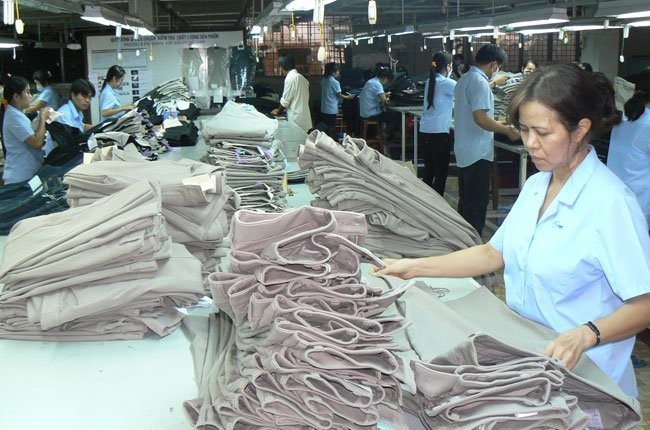(VOVworld) – The EU-Vietnam free trade
agreement is in the negotiation stage and likely to be signed this year,
promising many opportunities for Vietnam in tax slashing, commercial advantages,
investment attraction, and market expansion. In addition to benefits will come challenges
which both the Vietnamese government and businesses should pay more attention to
and make necessary changes in regulations, policies, and production activities.
 |
| With the Vietnam - Eurasian Economic Union free trade agreement, Vietnam’s garments and textiles products will benefit the most. Up to 82% of all kinds of tariff are committed to be slashed and 42% of items to be imposed with a tax rate of 0%. (Photo: Van Nam) |
The EU-Vietnam
free trade agreement is a new deal with more commitments to cut tariffs, create
commercial advantages, and improve investment, business environment,
competition, and sustainable development.
The agreement is
expected to boost Vietnam’s
GDP 8% and its exports to the EU 10% by 2025.
Tran Thi Thanh
Tam, Deputy Director of the Center for Small and Medium-sized Enterprise Support
of the Vietnam Chamber of Commerce and Industry, said the FTA will create many
challenges that will force domestic companies to renew their technology and
improve their competitiveness and product quality.
Tam said “signing an FTA with the EU will create an
open market for Vietnam,
particularly for Vietnam’s
garments, textiles, leather footwear, and seafood. But it will also put pressure
on SMEs to restructure and improve their competitiveness. Once the agreement
takes effect, Vietnamese firms will enjoy tax reductions and purchase high-tech
and high- quality materials from the EU at lower prices.”
Under the
agreement, tariffs on most Vietnamese export items will be slashed, but some
commodities like food, garments, textiles, and footwear, Vietnam’s hard currency
earners, will still trigger stiff tariff.
Tariff reductions
will make Vietnamese products more competitive but will not guarantee that
Vietnamese enterprises exporting to the EU will overcome other non-tariff
barriers.
Professor Ari
Kokko, director of the Asian Studies Center of Denmark’s Copenhagen
Business School,
advised Vietnam
to make careful preparations to meet technical standards, and food hygiene and
safety and animal and plant quarantine regulations.
He said “now the FTA, of course formally, will mainly involve the removal of tariffs. Although the tariffs are low in general for most product categories, we’ll still have quite high tariffs in some industries that are important for Vietnam – food products, textiles, garments, and shoes. When tariffs are taken away, the competitiveness of Vietnamese production improves strongly but doesn’t guarantee, of course, Vietnamese companies are going to be successful in the European market.”
Kokko blamed that for “other kinds of obstacles, non-tariff barriers – regulations related to safety, technical characteristics/standards. So challenges will remain. But it’s going to be an important step in order to increase Vietnam’s exports in these labor-intensive industries. Labor-intensive industries, of course, are important because they create jobs. I think there are a couple of areas where European importers are going to look at Vietnam and expected improvements. We have environmental regulations, corporate social responsibility as an important element that includes transparence, clean decision making, and anti-corruption characteristics. Improvements in these areas are essentially important and I think Vietnam has possibility to make advances and make important progress.”
The European
Trade Policy and Investment Support Project (EU-MUTRAP) released statistics
last year on Vietnamese agricultural goods refused by major markets.
Nguyen Dinh
Cung, director of the Central Institute for Economic Management, said that the statistics
reveal the challenges of non-tariff barriers.
Cung noted that “due to their small scale and limited knowledge
about market barriers set by importers, Vietnamese businesses need support from
the state, which should revise regulations and improve the business environment
to create more favorable conditions for commercial and trading activities and reduce
costs and risks for enterprises. It will make it easier for domestic exporters
to meet the norms set by importers.”
Vietnam is in a
transitional stage and a free trade agreement with the EU will diversify its economy.
Vietnam
needs to create flexible policies to support the national economy and domestic
companies.